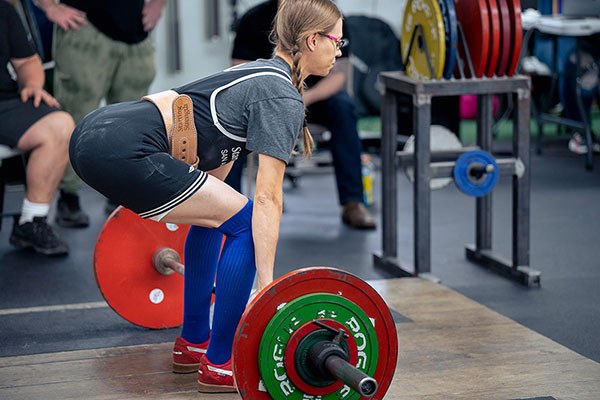
Pulling from the Floor: A Reminder
by Mark Rippetoe | January 16, 2024
The basic rule of pulling a
heavy weight off the floor is that the lifter/barbell system must be
in balance. This means that the mass of the lifter/barbell system –
and thus the weight of the load moving up – must be evenly divided
forward and behind the balance point, the middle of the foot. If the
weight is heavy enough, it will not be a completed deadlift if the
mass is not centered over the middle of the foot.
In
other words, you can’t pull a max deadlift if you are off-balance.
You can pull a heavy clean from forward of the mid-foot, although it
is inefficient, because it’s much lighter than a heavy deadlift –
maybe only 65-70% of the weight. You can pull a heavy snatch almost
any way you want to, because it’s light relative to a deadlift, and
getting the weight off the ground is not the limiting factor in a
snatch, or a clean. But even with these lighter pulls, they rack
easier at the top if they are closer vertically to the eventual
balance point over the mid-foot they must settle into in the rack
position.
The
rack position of a clean or a snatch must be in balance over the
mid-foot for the same reason the start of the pull must be in
balance. If you rack the clean or the snatch off-balance, you’re
going to have to walk around on the platform to balance the bar. It’s
easier to rack a snatch overhead or a clean on the shoulders if there
is not much horizontal motion to overcome at the top, and a vertical
pull over the mid-foot accomplishes this.
The
balance analysis also dictates the start position of the pull. All
limit deadlifts leave the floor when the bar is over the mid-foot and
the shoulders are slightly in front of the bar, regardless of what
the lifter thinks is going to happen. This position places the bar in
balance, and the lats in the best position to keep it there, as
discussed in the Blue Book. It also places the hips in a higher
position than most coaches teach as the start position. I have found
no video examples of limit deadlifts being pulled any other way.
Oddly enough, this seems true for wide-stance (“sumo”) deadlifts
as well. If the bar is forward of balance, you just can’t lock it
out.
There
is a tendency for alternate-grip deadlifts to cause the bar to drift
forward from the supine hand. The reasons for this are discussed in
Dr. Mia Inman’s article, An Examination of Control of the Supine Hand in a Heavy Deadlift. If the forward drift is excessive, as it sometimes becomes, this will
disrupt the balance requirement enough to create a failed attempt.
Physics is a bitch, but at least it’s understandable.
The
correct start position for any pull is with the bar over the mid-foot
with shoulders just forward of the bar. The knees/shins cannot be too
forward, or the bar will be shoved forward of this balance point over
the mid-foot. This will entail a higher hips position than most
lifters like to use – and in fact may have already been taught,
since this relationship is poorly understood by most coaches. It is
true that a clean or a snatch can
be pulled from this inefficient forward/low-hips position, but it’s
easier to pull heavier weights efficiently. When you try to pull a
limit deadlift from a low-hips position, the back angle will always
change to facilitate the correct position before the bar leaves the
floor. So you might as well just start there.
When
you pull from the floor, take a narrow stance with the middle of your
shoe directly under the bar – verify this visually. This position
will place your vertical shins about an inch from the bar. Unlock
your knees while keeping your hips high, and let your shins drift
forward until they touch the bar. Do
not move the bar from its position of balance over the mid-foot.
Then, instead of dropping the hips, squeeze the chest up until your
whole spine is in extension. This will generate the correct hips
position and the most efficient vertical bar path for the strongest
pull, whether it’s a deadlift, clean, or snatch.
Discuss in Forums
Credit : Source Post






